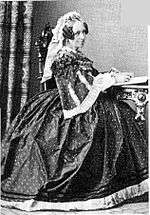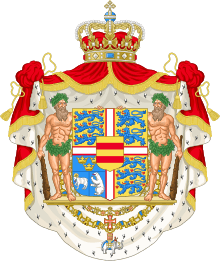Princess Charlotte of Denmark
| Charlotte of Denmark | |
|---|---|
| Princess of Hesse-Kassel | |
 | |
| Born |
30 October 1789 Christiansborg Palace, Copenhagen |
| Died |
28 March 1864 (aged 74) Christiansborg Palace, Copenhagen |
| Spouse | Prince William of Hesse-Kassel |
| Issue |
Caroline Frederica Marie Luise Charlotte Louise, Queen of Denmark Frederick Auguste Sophie Sophie Wilhelmine |
| House | Oldenburg |
| Father | Hereditary Prince Frederick of Denmark and Norway |
| Mother | Sophia Frederica of Mecklenburg-Schwerin |
Princess Louise Charlotte of Denmark (Danish: Charlotte af Danmark; 30 October 1789 – 28 March 1864) was a Danish princess, and a princess of Hesse-Kassel by marriage to Prince William of Hesse-Kassel. She played an important role in the succession crisis in Denmark in the first half of the 19th century.
Life

She was born in Christiansborg Palace to Frederick, Hereditary Prince of Denmark and Norway, and Sophia Frederica of Mecklenburg-Schwerin.
On 10 November 1810 in Amalienborg Palace she married Prince William of Hesse-Kassel. Her spouse was in Danish service from his youth, and the family lived in Denmark.
Princess Charlotte was described as a wise, practical and thrifty, and kept the finances of her household under strict control.[1] She had some interest in art and poetry, and reportedly felt herself to be a Danish patriot.[2] Charlotte played some part in the succession crisis which occurred because her cousin, King Frederick, lacked a male heir. She supported the solution that her branch of the family should succeed to the throne, and because of this, she opposed the Schleswig-Holstein matter.[3]
In 1839, her brother Christian VIII of Denmark succeeded their cousin on the throne, and during his reign, Charlotte had an important position at the Danish royal court in Copenhagen because her brother favored that her line of the family should succeed to the throne after his male line had died out.[4]
In 1848, her brother died and was succeeded by his childless son, her nephew. In 1850, the Danish government was pressured by the Empire of Russia to discontinue its support of her line in the succession order in favor of the Duke of Oldenburg, her son-in-law. Christian of Oldenburg had displayed anti-Danish sentiment during the recent war, and when gehejmeråd F.C. Dankwart, on behalf of the government, issued the demand that she should renounce her and her son's right to the throne in favor of her son-in-law, she replied: "It is impossible: the Danish people would under no circumstance accept as King a Prince from a house that has made war against Denmark, and that is so hostile toward us".[5] In exchange, she demanded that the House of Oldenburg purchase the Duchy of Hesse and declare it a kingdom, so that her son Frederick could "Switch one Kingdom for another".[6] After having been persuaded that her terms were impossible and that Christian of Oldenburg in fact had good support for his claim, she agreed to renounce her and her son's claims to the throne.[7]
On 18 July 1851, she and her son Frederick renounced their claims to the Danish throne in favour of her daughter Louise, who in turn renounced it in favour of her spouse.
Louise Charlotte is the matrilineal great-grandmother of Nicholas II of Russia, William IV, Grand Duke of Luxembourg and George V.
She died in Christiansborg Palace.
Issue
- Karoline Friederike Marie of Hesse-Kassel (15 August 1811 – 10 May 1829)
- Princess Marie Luise Charlotte of Hesse-Kassel (9 May 1814 – 28 July 1895) Married Prince Frederick Augustus of Anhalt-Dessau.
- Louise of Hesse-Kassel (7 September 1817 – 29 September 1898). Married Christian IX of Denmark
- Friedrich Wilhelm Georg Adolf, Landgrave of Hesse-Kassel (26 November 1820 – 14 October 1864). Married, first, Grand Duchess Alexandra Nikolaevna of Russia, a daughter of Nicholas I of Russia and Charlotte of Prussia. She died soon after their marriage. He married, second, Princess Anna of Prussia
- Auguste Sophie Friederike of Hesse-Kassel (30 October 1823 – 17 July 1899. Married Baron Charles Frederick von Blixen-Finecke.
- Sophie Wilhelmine of Hesse-Kassel (18 January – 20 December 1827)
Ancestry
References
| Wikimedia Commons has media related to Princess Louise Charlotte of Denmark. |
